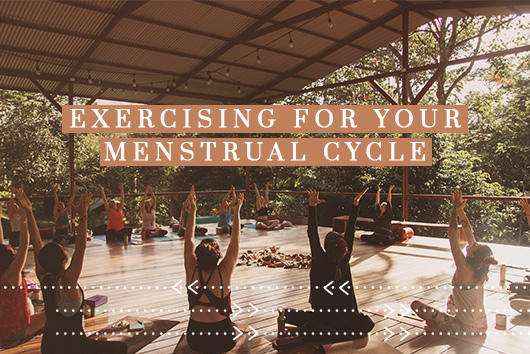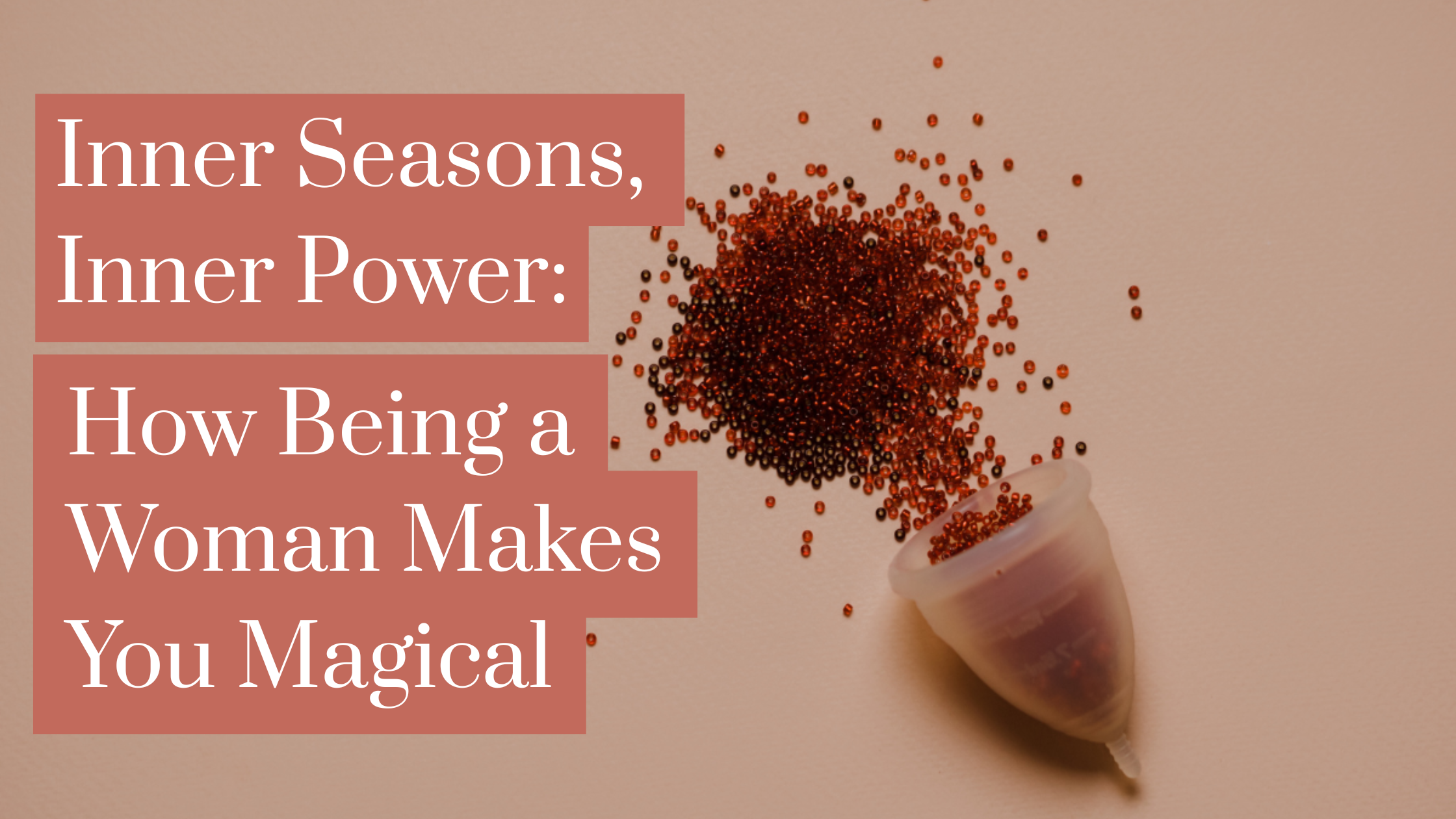5 Ways to Balance Hormones Naturally

Usha Anandi. 14 | MAY | 2023
Every week I receive messages from members of our community asking about tips to balance hormones. If you’ve ever taken a training with me, you know that I’m obsessed with hormones. Many of the challenges modern women face today are associated with imbalanced hormones, so today I’m taking the time to fully geek out and share five of my favorite ways to balance your hormones.
One of my favorite ways to support balanced hormones is by making an herbal infusion. I’m a firm believer that herbalism is people’s medicine, which means it should be simple, easy to integrate, and accessible.
So come a little closer and stir my cauldron with me, won’t ya? All weirdness (or hilariousness?) aside, I’ve got an AMAZING herbal infusion recipe for you.
Click below to access a downloadable PDF + herbal education video I’ve made for you.
Okay, now it’s time to geek out. The female hormone system is an ecosystem; when one aspect is out of balance it affects the whole. Many women experience hormonal imbalance without even knowing it.
Here are a few of the symptoms:
- Low libido
- Vaginal itchiness or dryness
- Bloating and/or weight gain during the premenstrual phase
- Mood swings
- Anxiety or insomnia before menstruation
- The premenstrual phase of the cycle is shorter than the follicular phase after you menstruate
- Breakouts around the chin, jaw, or neck
- Unexplained hair growth on the face or thickening and/or darkening of bodily hair
- Premenstrual headaches or migraines
- Water retention
- Irregular menstrual cycles, spotting before menstruation, and/or heavy bleeding during menstruation
- Night sweats
- Uterine fibroids
- PCOS
One of the reasons that allopathic treatment can have side effects or even be ineffective is because it focuses on balancing only one hormone at a time.
The human body is a living, breathing ecosystem. Treating one part of the body without thinking about how it affects the whole is often both ineffective and may come with a range of side effects.
In our fast-paced patriarchal world, many of us feel we have no choice but to push our body to its limits in order to meet a certain standard of so-called ‘success’. The body can only meet this unrealistic standard for so long, and eventually, we may experience various challenges like adrenal burnout, digestive issues, thyroid problems, and insulin resistance as the body’s way of communicating with us something isn’t working.
If you’re currently experiencing imbalanced hormones, I know it isn’t fun. After over five years on the pill, I experienced extreme hormonal imbalance that resulted in weight loss, acne eruptions, hair loss, and extreme mood swings.
Luckily for me, I had the education, the support, and the practices to guide myself back to balance and now I want to share with you my top five tips so you can start cultivating balance today.
1. Get more meaningful rest


We live in a chronically stressed and sleep-deprived world.
Pushing, forcing, and overworking our way through life will catch up to us eventually and when it does, it often results in hormonal imbalance. Chronic stress in the body is not an isolated condition – it affects all vital systems by elevating heartbeat and blood pressure, inhibiting proper digestion and elimination, raising acidity and inflammation levels, suppressing immune function, and last but not least, causing an imbalance in the female sex hormones estrogen and progesterone.
The body prioritizes survival over reproduction, which makes sense at the most basic level according to evolution.
If we don’t survive a certain stressor, we won’t even be alive – so how could we reproduce? On a deeper level, when we’re stressed, we’re unable to function at an optimal level both physically and emotionally, so our hormones essentially ‘save’ us by making it difficult for conception to occur during that time.
Your stress hormones (adrenaline and cortisol) and your sex hormones (estrogen and progesterone) have an interesting relationship with one another. Both cortisol, estrogen, and progesterone are made out of the same base hormone, pregnenolone, sometimes referred to as the ‘Mother of All Hormones’.
Your body’s stress hormones are secreted by the adrenal glands, two walnut-shaped glands that rest on top of the kidneys on the backside of the body.
When your body is chronically stressed, it sends continuous messages to the adrenal glands to pump out more and more stress hormones.
Eventually, the adrenal glands run out of life-force and we experience what’s called hypoadrenia or adrenal fatigue.
But it doesn’t stop there. Remember, your body loves you SO much and it will do anything to help you survive, and in this case, that means to release more stress hormones into your body so your system stays on high alert to possible danger.
The problem?
Once stress levels become chronic, the body will transform the hormone pregnenolone into cortisol instead of progesterone. This is classically referred to as ‘progesterone steal’ and can greatly affect the ability to conceive.
But that’s not all.
Progesterone is perhaps most famous for ruling the premenstrual phase by supporting the lining of the uterus in thickening to aid in possible conception. Healthy progesterone levels also reduce mood swings, anxiety, and support the release of excess fluid from the body.
High states of stress and the prioritization of cortisol over progesterone is one of the leading causes of challenging conception, mood swings, and a shortened menstrual cycle as a whole.
When we’re in a state of chronic stress and sleep deprivation, it can often feel like there’s no way out.
But I’m here to tell you, there is – and it all starts with the way you rest.
Most of the women I work with are well aware that they need to rest more, they just don’t know HOW.
When I say rest meaningfully, I don’t mean just plumping yourself down on the couch, scrolling through your phone, and putting yourself into a technologically induced coma.
To rest meaningfully is to give yourself an opportunity to do the most important thing – absolutely nothing.
Ask yourself this – how much of your day is structured?
Within that structure, how much time do you have allotted to just being with your body, your breath, and observing your inner world?
If you’re like me, you might feel anxious when this space to do ‘nothing’ arises. Feeling like we’re useless, not doing enough, or wasting our time when we’re offered the opportunity to relax is a symptom of a patriarchal system that teaches us we are what we do.
Giving yourself permission to turn off the phone, clear your schedules, and prioritize your own well-being is not only imperative for the balance of your hormones, but for your ability to find balance and ease in a system that teaches the opposite.
One of the most profound ways we can add meaning to our relaxation is by structuring it, i.e. going to a class, a retreat, or even setting a timer for ourselves during a period of relaxation.
Here are a few of my favorite practices that will help you balance sex hormones, reduce stress hormones, and return to a state of relaxation:
Restorative yoga
The practice of Restorative yoga offers us the opportunity to consciously manipulate the nervous system into a state of relaxation using various postures while supported by props like pillows, bolsters, blankets, and cushions. Practicing Restorative yoga regularly can support your body to metabolize hormones, releasing chronic patterns of tension, improve quality of sleep, and lower levels of stress hormones.
Yoga Nidra
Yoga Nidra – often referred to as ‘enlightened sleep’, this practice is traditionally done lying down in a supine position with the eyes closed as a teacher systematically guides you through the body with instruction to relax.
Many of us wake up from sleep without feeling fully rested. As Yoga Nidra is the practice of complete and total relaxation, many teachers of this method share that 1 hour of practice is equal to 4 hours of regular sleep.
Learning how to truly soften, release, and let go is a skill. Be patient with yourself and remember, the more you practice – the faster you’ll feel the results.
2. Limit screentime and exposure to artificial light


Light therapy is a new field of research that is emerging to support women balancing their menstrual cycle and lengthening their menstrual phase to increase chances of conception. In this type of therapy, a nightlight or lamp is turned on while sleeping during the full moon and two days following to help the body find a natural rhythm and return to balance.
Our bodies evolved in nature. Just as Mother Earth experiences cycles, so does the human body. One of the cycles that we’re specifically sensitive to is the moon. Our pineal and pituitary glands are responsible for the circadian rhythm of the body and sending instructions to other endocrine glands as to when to release certain hormones.
Our ancestors existed in harmony with nature with very little exposure to artificial light. For many of us living in modern existence, this is no longer the case. We are exposed to artificial or ‘blue light’ constantly, from our phones, computers television screens, and even street lights. Our bodies are thousands of years old, but these sources of artificial light are barely a hundred years old – so our body can’t tell the difference. When we’re exposed to blue light, it sends a signal to our glands to stay awake.
Here are a few simple practices to keep in mind:
- Eliminate the presence of artificial light in your bedroom by purchasing quality curtains or hanging a blanket over the window.
- Turn off internet routers while sleeping.
- Turn off your phone or place it on airplane mode and far away from your bed as you sleep.
- Limit screen time, especially before the sun comes up and after the sun goes down.
I’m someone who feels very creative at night. One of the apps that I LOVE that supports me in continuing to write without increasing my exposure to blue light is called f.lux and can be downloaded on Mac computers to help the entire system go into ‘darkroom’ mode.
If you have a smartphone, check to see if your provider offers a darkroom option and experiment with keeping it on all day and night to notice the effects.
When you limit your exposure to blue light, your body will more easily sync with the natural cycles of the moon which improves hormone balance, quality of sleep, and overall experience of life.
3. Support Digestion


In the ancient Eastern science of Ayurveda, the health of our digestive fire is essential for the health of all other bodily systems. According to this science, over 95% of all states of dis-ease are caused by impaired digestion. Hormonal imbalance is no different.
Hormones are metabolized in your body through your digestive system and organs of detoxification like the liver and kidneys.
When you’re unable to properly digest your food, your body excretes vital nutrients like vitamins and minerals that are precursors to healthy hormone production.
Stagnant waste in the gut puts excess strain on the liver and kidneys, two important organs of detoxification that are also responsible for metabolizing excess hormones during the menstrual cycle.
To ensure your body is metabolizing hormones properly, follow these two steps:
- Limit intake of stress-causing agents in your diet like alcohol, caffeine, red meat, and processed foods.
- Nourish your digestive system by adding carminative herbs like ginger, cumin, fennel, black pepper, turmeric, and mint into your diet. Experiment with adding a daily serving of live fermented food into your diet like yogurt, sauerkraut, and kimchi to feed the beneficial microbes in your gut and support healthy digestion.
4. Take a quality mineral supplement daily



Modern agricultural practices of planting one plant in long rows without other vegetation is called ‘mono-cropping’. This technique isn’t just affecting the mineral content of our soil, but the foods we eat, and our bodies as well.
Minerals are some of the most overlooked and misunderstood nutrients in modern nutrition today. Many of us don’t pay attention to them, simply because we assume that the foods we’re eating contain the minerals we need. Let’s be clear – unless your family has stewarded the same piece of land for generations and personally nurtured and cared for its well being, it’s likely that the food you’re eating isn’t exactly nutrient-rich. Although it may look the same, the food we eat today is not the same food that our grandparents once enjoyed.
The food we eat sources its nutrients from the soil. When the soil has been used repeatedly to grow the same crop season after season, it’s vitamin and mineral content is depleted. Less minerals in our soil mean fewer minerals in our food and eventually, fewer minerals in the body.
Minerals are so important, not only for the proper function of your nervous system, but for the production of your bones, teeth, hair, and nails, the proper function of the digestive system and of course – the production of hormones.
There are two ways to ensure you’re getting proper minerals in your diet:
- Know where your food comes from. If it’s possible in your area, buy from small, local farmers when and if you can. Get to know the people who touch, nurture, and grow the food you’re putting in your body. By making a relationship with them, you can learn how they grow the food you’re eating and create a deeper understanding of the nutrient levels you’re putting in your body.
- Take a quality trace mineral supplement. It isn’t always possible to know where your food comes from. Even when I do, I still take a quality trace mineral supplement just to make sure I have my basis covered. Personally, I’ve had huge success with this brand and bring it with me wherever I go. Warning, the liquid supplement tastes strongly so if you’re sensitive to that, opt for the pill form.
5. Eat a well balanced, whole food diet.


We hear it all the time, but truly – you are what you eat. The food you intake is literally transformed by the fire of your digestive system and its nutrients are assimilated and sent to the parts of the body that need them the most. When you’re not eating right, your body lacks the vital nutrients it needs to survive.
In Ayurveda, the reproductive system is both the last layer of the body to receive any nutrients from our diet and the first layer to go out of balance. If you’re not eating in a supportive way, your sex hormones will tell you.
Here are a few helpful tips to create a more nurturing, whole food diet:
- Lower your sugar intake. This means cutting out forms of processed sugars and opting for healthy forms of fructose (like fresh fruits) instead. This one is BIG – our hormones are directly connected to our insulin or blood sugar levels. When our blood sugar has huge spikes or dips, our hormones can quickly go out of balance.
- Make sure you’re eating regular meals. Keep your blood sugar levels stable by creating a personal eating routine that fits your schedule.
- Consume foods with good cholesterol. Your body uses cholesterol to create pregnenolone, which is the building block for the production of both progesterone and cortisol.
- Eliminate sources of synthetic or plant-based estrogen. In the world of processed foods, there are so many estrogen mimickers out there that can throw off your hormone balance and wreak havoc in your system. If you’re experiencing major hormonal imbalance, eliminate all soy-based products and cut down on your intake of cow’s milk, as milk has over 60 different hormones that can disrupt the balance of your unique system.
If you’ve been challenged with hormonal imbalance, remember to be patient with yourself. We cannot get to a new destination by taking the same path, we have to forge a more feminine way – we have to be soft with ourselves.
Healing your hormone system and gently guiding your body back into balance can take time and a myriad of tools – which is why I supplied so many different ones above.
More and more women reach out to me every day for support with hormonal imbalance – it’s a hot topic these days.
After working with thousands of womben, I noticed that the #1 obstacle to accessing radiant fertility is burnout and lack of nourishment.
That’s why I’ve created this AMAZING at home herbal infusion for fertility and hormone balance, because we ALL deserve to feel fully alive in our bodies.






